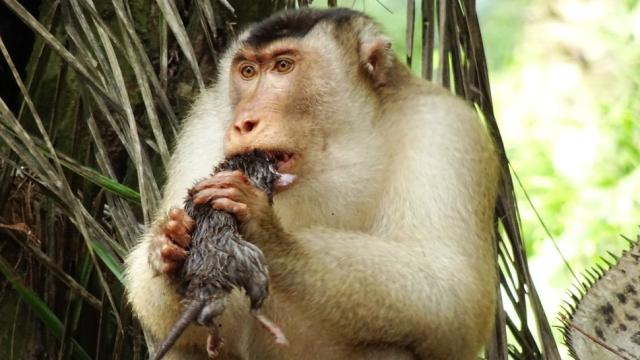Pig-tailed macaques in Malaysia love to visit oil palm plantations, where they snack on abundantly available fruit. Despite the damage inflicted on the crops, these monkeys actually do more good than harm owing to their predilection for an even-worse pest: rats.
New research published today in Current Biology shows that southern pig-tailed macaques have been falsely maligned for their role in pillaging oil palm plantations. As the study shows, the damage inflicted on the crops by these monkeys is actually quite minimal. What’s more, their presence in the plantations are actually beneficial, as pig-tailed macaques actively search for and consume rats.
Oil palm is a widely consumed vegetable oil typically found in processed and packaged foods. In Malaysia, the world’s leading producer of palm oil, annual production is around 17.6 million tonnes, representing 30 per cent of the world’s production, according to the new research, led by Anna Holzner from the University of Leipzig and the Max Planck Institute for Evolutionary Anthropology in Leipzig.
For the new study, Holzner, along with co-author Nadine Ruppert from Universiti Sains Malaysia and their colleagues, studied the behaviour of two groups of southern pig-tailed macaques living in Malaysia’s Segari Melintang Forest Reserve and the surrounding oil palm plantation from January 2016 to September 2018. They were hoping to learn more about the potential impacts on the plantation by the monkeys, which are considered pests.
“Here, we present the first data on macaques’ net damage to oil palm crops and their effect on plantation rats,” the authors wrote in the paper.
The plantation, according to the paper, represented around one-third of the monkey’s total home range, and the monkeys spent an average of around three hours per day there. As suspected, the pig-tailed macaques ate copious amounts of oil palm fruits, amounting to 11.3 tonnes per year. That certainly sounds like a lot, but it represents a mere 0.56 per cent of the total oil palm production in the monkeys’ home range.
Rats, on the other hand, inflicted far more damage, causing a 10 per cent loss of palm oil. This means the rats are nearly 18 times worse than the monkeys, but that’s not the entire story, as the pig-tailed macaques were shown to be capable of reducing the rat population by more than 75 per cent. That means farmers should seriously consider replacing chemical poisons with macaques — not a bad idea, given that rodenticides are expensive, inefficient, and harmful to other wildlife and the environment.
“I was stunned when I first observed that macaques feed on rats in plantations,” said Ruppert in a press release. “I did not expect them to hunt these relatively large rodents or that they would even eat so much meat. They are widely known to be [fruit-eating] primates who only occasionally feast on small birds or lizards.”
To catch the rats, the macaques search for them inside palm trunk cavities, where the rodents seek shelter during the day. A single group of pig-tailed macaques can snatch 3,000 rats per year, according to the research.
The scientists estimate that macaques could potentially reduce the damage inflicted by rats from 10 per cent down to 3 per cent. That’s an additional $877,000 per year in terms of preserved yield, according to the paper.
Pig-tailed macaques are currently listed by the International Union for Conservation of Nature as a vulnerable species, primarily owing to habitat loss and human hunting. Oil palm plantations are responsible for much of this habitat loss; oil palm plantations currently cover nearly 190,000 square kilometres of land around the world.
But as the new research shows, if would be in farmers’ best interest to preserve this species and their forests. The researchers say pig-tailed macaques are a viable form of environmentally friendly pest control and that plantations should establish wildlife corridors connecting forests to plantations.
Oh, and if you think rat-eating monkeys are weird, chimpanzees in Gabon’s Loango National Park have been observed to eat tortoises. So yeah, primates aren’t exactly what you’d call picky eaters.
